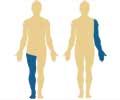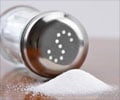Epsom salt administered to women at risk of pre-term delivery could cut reduce risk of cerebral palsy in their babies, a study suggests.
Cerebral palsy refers to a group of neurological disorders affecting control of movement and posture that limit activity. Brain damage may occur during pregnancy or early childhood. Its causes are not well understood, but a third of all cases are associated with preterm birth, according to the U.S. National Institutes of Health.Moderate or severe cerebral palsy was diagnosed in 1.9 per cent of women treated with injections of magnesium sulphate — better known as Epsom salts — compared to 3.5 per cent in those who were given a placebo, researchers report in Thursday's New England Journal of Medicine.
The study included 2,241 mothers who were at high risk for delivering between 24 and 31 weeks of gestation. Babies are considered to be premature if they are born before 37 weeks are completed.
The findings mean 30 women who are less than 28 weeks into pregnancy would need to be treated to prevent one case of moderate to severe cerebral palsy, said the study's lead author, Dr. Dwight Rouse, a professor of obstetrics and gynecology at the University of Alabama at Birmingham.
"This is a major advance," said study author Dr. Catherine Spong, chief of the National Institute of Child Health and Human Development in Bethesda, Maryland.
"Our results show that obstetricians can use magnesium sulphate, which they have experience prescribing, to reduce the risk of a devastating condition, cerebral palsy, in preterm infants."
Advertisement
It's not known how magnesium sulphate may help, although previous studies suggest it may stabilize blood vessels in the preterm baby's brain and protect against damage from lack of oxygen.
Advertisement
But belief in using magnesium sulfate to prevent cerebral palsy among those at high risk for preterm birth is not universal among neonatal experts.
A commentary accompanying the study notes the study was done in specialized centres, and the results may differ in community hospitals.
"Is it now time to recommend this treatment?, Although promising, we would advise caution, " wrote Dr. Fiona Stanley of the Telethon Institute for Child Health Research at the University of Western Australia in Perth and Caroline Crowther of the Australian Research Centre for Health of Women and Babies in Adelaide.
"Better understanding is needed of factors that might influence the likelihood that offspring will benefit from maternal magnesium sulphate treatment, such as the reason for imminent preterm birth, the dose of magnesium sulphate, and the timing of administration relative to birth and gestational age."
Source-Medindia
GPL/L













